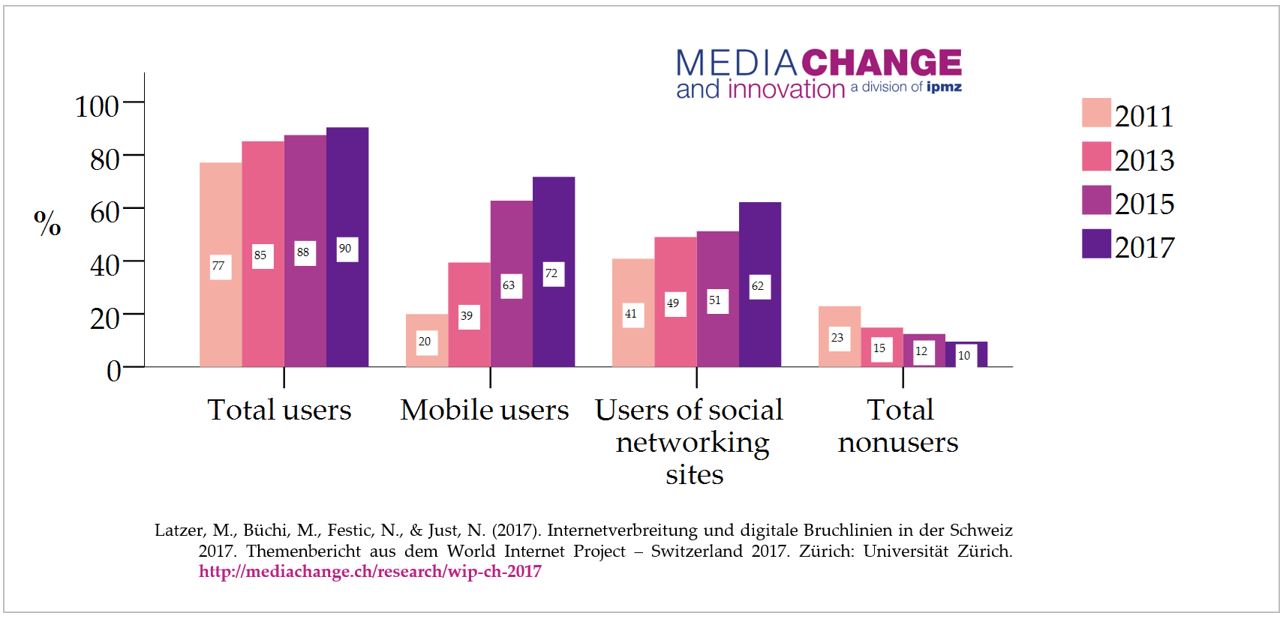World Internet Project – Switzerland 2017: Fact-Checking Increases as Trust in Online Content Drops
8th November 17Nine out of every ten people in Switzerland use the Internet. Usage time has doubled since 2011 and accessing the Internet from mobile devices has become common place for most demographics. The Internet is now not only the most important media source for information but also serves as the primary source of entertainment.
Searching for news and checking facts online has seen a considerable increase since 2011. During this period, overall trust in online content has significantly decreased. Half of all Internet users express concern regarding privacy violations online, while 44% feel they are able to control their privacy on the Internet.
Digital well-being is strong in Switzerland: Digital overconsumption and the feeling of missing out on more important things are more common among young people and people with lower levels of education, but mostly not seen as a problem. 83% state that they can distinguish between important and unimportant online activities. 75% of users believe they are able to target specifically which people and information sources they follow online, while 73% believe they can adjust the settings of Internet services and devices so that these will not disturb them.
For detailed information we refer to the four reports (in German) of the World Internet Project – Switzerland 2017 as well as to the WIP-CH 2017 Press Release in German and English.
Reports 2017 (Themenberichte)
The World Internet Project – Switzerland 2017
 For the fourth time since 2011, a representative survey within the World Internet Project – Switzerland (WIP-CH 2017) was carried out by the Media Change & Innovation Division at the Institute of Mass Communication and Media Research (IPMZ), University of Zurich under the leadership of Prof. Michael Latzer.
For the fourth time since 2011, a representative survey within the World Internet Project – Switzerland (WIP-CH 2017) was carried out by the Media Change & Innovation Division at the Institute of Mass Communication and Media Research (IPMZ), University of Zurich under the leadership of Prof. Michael Latzer.
The World Internet Project (WIP) is a comparative longitudinal study that records the penetration and use of the Internet in more than 25 countries in an international comparison and analyzes social, political and economic implications of the development of the Internet.
The WIP-CH 2017 was supported by the Dean’s Office of the Faculty of Arts at the University of Zurich.
World Internet Project – Switzerland 2017: Verstärkte Faktenüberprüfung und weniger Vertrauen in Online-Inhalte
Neun von zehn nutzen in der Schweiz das Internet. Die Nutzungszeit hat sich seit 2011 verdoppelt und auch der Zugang von unterwegs ist in praktisch allen soziodemographischen Gruppen stark verbreitet. Das Internet ist nicht nur die bedeutendste mediale Informationsquelle, es liegt im intermedialen Vergleich erstmals auch für Unterhaltungszwecke auf dem ersten Platz.
Die Nachrichtensuche und das Überprüfen von Fakten im Netz sind seit 2011 wesentlich angestiegen. Parallel dazu ist insgesamt das Vertrauen in Online-Inhalte erheblich gesunken. Die Hälfte aller Internetnutzer äussert Bedenken bezüglich Privatsphäre-Verletzungen im Internet, während 44% glauben, ihre Privatsphäre online kontrollieren zu können.
Das digitale Wohlbefinden in der Schweiz ist hoch: Digitaler Überkonsum und das Gefühl, durch die Internetnutzung Zeit für Wichtigeres zu verlieren, sind häufiger unter jüngeren Nutzern und Niedriggebildeten, werden insgesamt jedoch als relativ unproblematisch beurteilt. 83% geben an, zwischen wichtigen und unwichtigen Internetaktivitäten unterscheiden zu können. 75% der Nutzer denken, dass sie gezielt auswählen können, von welchen Quellen sie online Informationen erhalten, während 73% glauben, dass sie Internetdienste so einrichten können, dass sie sie nicht stören.
Für detaillierte Informationen verweisen wir auf die vier Themenberichte des World Internet Project – Switzerland 2017 sowie auf die Pressemitteilung.
World Internet Project – Switzerland 2017
Zum vierten Mal seit 2011 hat die Abteilung Medienwandel & Innovation des Instituts für Publizistikwissenschaft und Medienforschung (IPMZ) der Universität Zürich unter der Leitung von Prof. Michael Latzer eine repräsentative Befragung im Rahmen des World Internet Project – Switzerland (WIP-CH 2017) durchgeführt.
Das World Internet Project (WIP) ist eine vergleichende Langzeitstudie und erfasst in mehr als 25 Ländern die Verbreitung und Nutzung des Internet im internationalen Vergleich und analysiert soziale, politische und ökonomische Implikationen der Netzentwicklung.
Das WIP-CH 2017 wurde vom Dekanat der Philosophischen Fakultät der Universität Zürich unterstützt.

